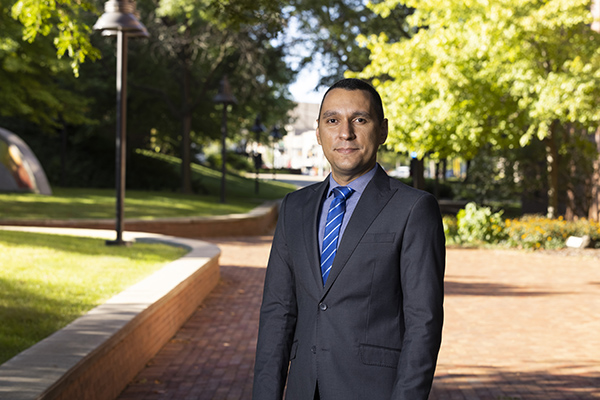Meet the CIT Faculty: Thiago Ferreira

Thiago Ferreira is beginning his first year as an Assistant Professor of Information Technology & Informatics in UM-Flint's College of Innovation and Technology. Ferreira has most recently held academic appointments (postdoctoral fellow and intermittent lecturer) at the University of Michigan-Dearborn. He investigates software refactoring, which is the restructuring of source code for the purpose of improving software quality.
Continue reading to learn more about Ferreira and his fascination with technology.
Becoming Interested in Teaching
Ferreira learned he had a knack for teaching after helping his colleagues, teammates, and friends with different topics. Then, while he was working toward his master's degree and Ph.D., he had the opportunity to teach some classes.
"For me, teaching was the best experience that I've ever had," Ferreira said. "Students told me that I changed their vision about what path they could take in their field. I said to myself, 'I want to be here.'"
Discovering Technology
Ferreira's first experience with technology was around 2001, when his dad brought home their first computer, which had an Intel Pentium III Processor and 32 megabytes of RAM memory at the time.
"I would waste my time drawing in Microsoft Paint and playing SimCity 3000, which was so impressive for me as a kid. After that, I think this guided my choices, because now, everything I do relates to computer science," Ferreira said.
Technology in his Free Time
Ferreira says that he was always interested in technology. In his free time, he enjoys coding, reading technology news, and watching technology videos.
"Technology is just a part of myself," Ferreira said. "I love thinking about how to evolve technology to help others. When you evolve technology, you solve problems. At the same time, you solve a problem that someone is facing in their life."
Describing His Research
Ferreira's area of research, software refactoring, may not sound familiar. He breaks it down: it's all about making developers' lives easier.
"Everything nowadays has some kind of software: your cellphone, your lightbulb, your door, or even your fridge. And that software has source code. I am researching how to make software and source code less buggy," Ferreira said. "We try to improve software quality by using some optimization techniques. Right now, we are not aware of robots doing any coding or delivering an entire system. Instead, there are humans developing source codes, and we need to make their lives easier."
Finding a Support System at UM-Flint
Ferreira has been a part of the Flint community for about a month now. While it was hard at first to adjust to the new surroundings, Fereira credits the friendly staff at UM-Flint with helping him find his way.
One day, when Ferreira passed through French Hall, he made small talk with a DPS officer, mentioning that he needed a parking pass. The DPS officer was able to take care of the situation right then and there!
"What surprised me is that like the DPS officer, people at UM-Flint support you. They try to help you. Instead of just telling you directions, people at UM-Flint walk you somewhere and then put you right in front of the main door you were looking for," Ferreira said. "I love this approach for new faculty, staff, and students."
Analogies to Help Students
Ferreira's favorite part about teaching students is when their faces light up with understanding. This tends to happen after Ferreira uses different creative analogies to illustrate topics in his field.
"The brilliant moment is when students say they understood, just because I used a different way to explain," Ferreira said.
The analogies Ferreira has dreamed up range from daily life activities and even games such as Minecraft.
"I remember last fall, I used an analogy with chests and items from Minecraft to teach how pointers, a feature of C and C++ programming languages, work. Of course, the analogies don't work with all students, but it's funny how they react when I bring the analogy in," Ferreira said. "They say, 'Do you know Minecraft, professor? Are you kidding me?' In the Zoom chat, another student said, 'Minecraft was a prime example!' After class, I thought, 'I can't believe I actually came up with Minecraft to teach today.'"
Related Posts
No related photos.
UM-Flint News
The Office of Marketing & Communications can be reached at [email protected].